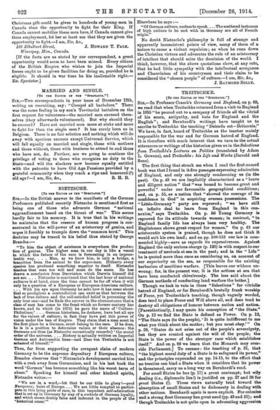TREITSCHKE.
[TO THE EDITOR OP TM "srscrirea."3 SIR, In Professor Cramb's Germany and England, on p. 69, we read that when Treitschke returned from a visit to England in 1895 " be poured out to a company of friends all the vitriol of his scorn, antipathy, and hate for England and the English" ; and Bernhardi's writings have taught us to ascribe to Treitschke the teaching " Delenda est—Britannia." We have, in fact, heard of Treitschke as the teacher mainly responsible for the war and for German hatred of England.. It is therefore with much interest that we turn to the actual utterances or writings of the historian given us in the Selections from Treitschke's Lectures on Politics (translated by Adam L. Gowans), and Treitschke : his Life and Works (Jerrold and Sons).
The first thing that struck me when I read the first-named book was that I found in it five passages expressing admiration of England, and only one strongly condemning us (in the past). On p. 48 we are implicitly characterized as a " brave and diligent nation" that "was bound to become great and powerful" under our favourable geographical conditions; and, on p. 55, as a nation that " showed the courage of its confidence in God" in acquiring oversew possessions. The "Little-Germany" party are reproved ; " we have still an infinite deal to learn from England in this con- nexion," says Treitschke. On p. 56 Young Germany is reproved for its attitude towards women; in contrast, "in England family life has always been very healthy. The Englishman shows great respect for women." On p. 61 our aristocratic system is praised, though he does not think it would suit his own land; and on pp. 109-113 our law is com- mended highly—save as regards its expensiveness. Against England the only serious charge (p. 120) is with respect to our treatment of neutrals at sea in the past; and in the " Life" he is quoted more than once as considering us, on account of our superiority on the sea, as responsible for the existing barbarism of maritime warfare. [This leaves our withers un- wrung; for, in the present war, it is the actions at sea that have been conducted chivalrously. The less said about the German methods of conducting land warfare the better.] Though we look in vain in these " Selections " for vitriolic hatred of England, or for Bernhardi's brutally frank worship of Force, yet Treitschke's teaching, though vaguely worded, does tend to place Force and Will above all, and does tend to destroy all obligations of honour between nation and nation. [Parenthetically, I may quote his conception of "the State." On p. 12 we find the State is defined as Power. On p. 13, "The State says (to the people), It is quite indifferent to me what you think about the matter; but you must obey." On p. 39, "States do not arise out of the people's sovereignty, but they are created against the will of the people; the State is the power of the stronger race which establishes itself." And on p. 89 we learn that the Monarch may over- ride Parliament.] To resume : the teaching of p. 31, that "the highest moral duty of a State is to safeguard its power," and the principles expounded on pp. 14-15, to the effect that no treaties can bind a State when it considers that its power is threatened, carry us a long way on Bernhardi'a road.
For small States he has (p. 17) a great contempt; but wily dealing (i.e., diplomatic lies I) is justified on pp. 37 and 38 for great States (!). These views naturally tend toward the absorption of small States and to dishonesty in dealing with other nations. Bernhardi again is more explicit. For colonies and a strong fleet Germany has great need (pp. 43 and 51); ant. though Treitschke is not quite open in advocating aggression
as a policy, yet on pp. 121-122 he does appear to recommend war to Italy as a political weapon whereby she may gain her proper place. One deduces from what he says that he would not disapprove of unprovoked and aggressive war if only power could be acquired by its means ; that is the justification.
Bernhardi's "natural allies of Germany," the Turks, who are to be helped to be "strong and powerful," do not find favour with Treitschke, though it is to be presumed that they would be welcomed by him as a help towards the acquisition of power by Germany. On pp. 73-75 we read : "For what has the Turkish Empire achieved in three full centuries ? It has only destroyed. They have rushed on the West like a huge avalanche of mud, annihilating everything "; and other passages of similar import. Read "Belgium" for "the West," and we understand that the Turks are the natural allies of this new Germany that has lost her old self and become grievously transformed under the Prussian hegemony.
Of Treitscbke's views on war there is no space to write in this already over-long letter.—I am, Sir, &c.,



































 Previous page
Previous page